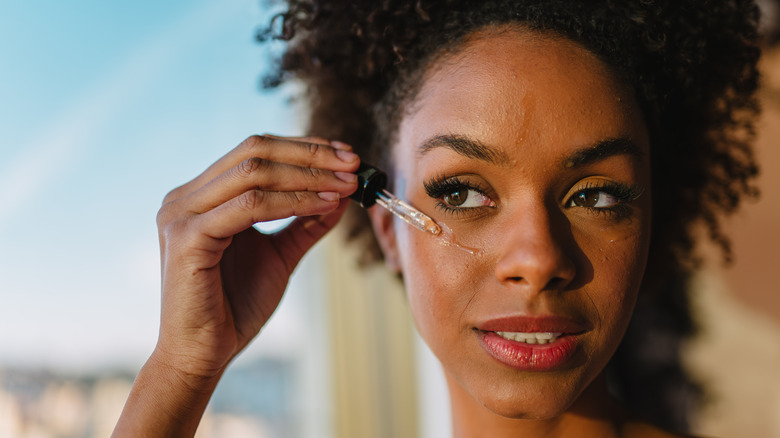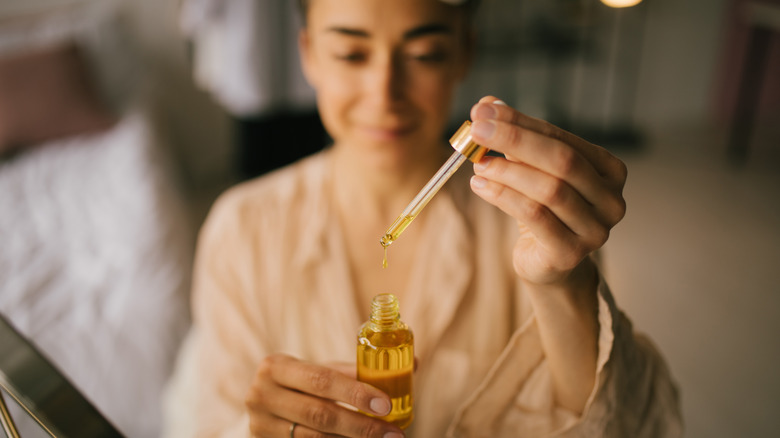Hydrate Vs Moisturize: What Your Face Oil Actually Does For Your Skin
The terms hydrate and moisturize are often used interchangeably in the skincare world. You might notice this while perusing products in the beauty department of your local pharmacy. This is mainly because, as cosmetic chemist Vince Spinatto told Allure, "Marketing terms can be defined by the brands pretty much however they want."
In a climate with little regulation on terminology, it can be hard to differentiate what is accurate and what is not. The question of hydrate vs. moisturize, especially in the context of face oils, is a very important one. Contrary to what marketing signage tells you, face oils cannot hydrate your skin. This should probably be included in a beginner's guide to facial oils.
Have you ever heard the saying, "like water off a duck's back"? Even though the phrase refers to someone not being affected by advice or constructive criticism, your mind essentially registers that it's not possible for water to stay on a duck's back. It slides right off. The same can be said of oils. All you have to do is try to mix oil with water to see that they won't blend. How do face oils work then? What do they actually do for your skin?
Oils retain moisture, they don't add it
The conversation surrounding face oils and hydration vs. moisture cannot be discussed without understanding certain key words – emollients, humectants, and occlusives. You've probably seen a combination of all or a few of these terms in skincare products you currently own. Emollients essentially act as skin-softeners, while occlusives trap in moisture that is already on your skin. Humectants — most commonly glycerin or hyaluronic acid — work by absorbing moisture from your environment and your skin to provide hydration.
Face oils can lock in existing moisture (occlusive) and soften skin (emollient), but they cannot hydrate. As dermatologist Dr. Elizabeth Tanzi told The Cut, "They (face oils) put a sealant on your skin by coating the top layer. This is different from pulling in water and hydrating skin." So think of a visual of wrapping your face with cling film — face oils are actually doing only that. They're locking in existing moisture but they don't hydrate.
In fact, according to New York City-based dermatologist and the founder of Entière Dermatology, Dr. Melissa Kanchanapoomi Levin (via Harper's Bazaar), " ... a lot of people who only use oils are actually really dehydrated or their skin barrier is compromised underneath all that application of oils." Does that mean you should give up oils altogether? No. But there is a proper way to use them.
Combine face oils with a hydrating face cream
If you're looking for solutions for dehydrated skin, combining humectants like glycerin or hyaluronic acid with face oils might be your best bet. As Levin told Harper's Bazaar, oils can't work alone when it comes "moisturizing or restoring the skin barrier." They're the one-before-the-last step in your skincare routine, assuming you're finishing off with sunscreen (which is recommended).
Start by cleansing your face with a gentle cleanser. Next, while your face is still damp, apply a hydrating serum (or cream) that contains glycerin or hyaluronic acid. Next comes the face oil to seal in the moisture.
Cosmetic chemist Ron Robinson told Allure that the focus should be on looking for "products that do both — have humectants that can attract water and have emollients that help seal moisture in." Sometimes this might look like using two different products and in some cases, you'll be able to find both in one.

